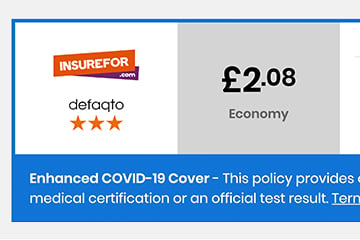"It’s best to consider buying your single trip insurance policy as soon as possible after booking your holiday. That way you’re covered if something happens in the lead-up and you need to cancel your trip. Don’t leave it too late to buy – you can’t claim for any events that happen before you buy your policy."
What does single-trip travel insurance cover?
Single trip cover can vary between insurance providers. So, it's important to make sure you're reading policy documents to understand what cover you'll get.
What it usually covers:
-
Holiday cancellation cover: If you need to cancel your holiday due to unexpected circumstances, like illness or a change in Foreign, Commonwealth and Development Office (FCDO) travel advice. In these scenarios, your travel insurance can cover associated costs.
-
Baggage cover: If your personal belongings are lost, stolen or damaged, your travel insurance can cover the cost of replacements.
-
Emergency medical treatment cover: If you become ill or injured during your trip and require medical care, travel insurance can cover the cost of emergency treatment.
-
Emergency repatriation insurance: This covers you if a medical team decides it's necessary to transport you home for treatment.
-
Travel disruption cover: If things like mechanical issues, bad weather or strikes cause delays or cancellations. In these situations, your travel insurance can help cover the cost of alternative arrangements or accommodation.
-
Low-risk sports: Some leisure sports and activities are covered as standard. These include sports like tennis. The odd round of golf should be covered by your travel insurance too. But if you're taking your own clubs, golf travel insurance might be worth thinking about.
What it usually doesn't cover:
This will also vary between providers and also if you've purchased any additional cover.
In general, though, single-trip travel insurance tends to exclude:
-
Undeclared pre-existing medical conditions: If you fail to declare any medical conditions when buying insurance, you won't be covered for related medical costs.
-
Travelling against government advice: If the FCDO advises against all travel to your destination and you choose to travel anyway, your insurance won't cover you. You also won't be covered for anything that was known before you bought your cover.
-
Extreme sports or adventure activities: This includes high-risk activities like rock climbing, scuba diving or winter sports. Usually, these aren't covered as standard, but you can add specialised sports travel insurance for an extra cost.
-
Natural disasters and terrorism: Travel insurance doesn't usually cover things like terrorist attacks or extreme weather events. At the very least, they might cover costs associated with medical care.
-
Alcohol or drugs: If you become ill or injured or lose your belongings while under the influence, your insurance won't cover the associated costs.
-
Malicious or illegal behaviour: If you engage in illegal behaviour, you won't be able to claim for any damage or medical costs associated with the behaviour.
Optional extras to enhance your cover
Standard travel insurance might not cover everything you're planning during your trip.
So, it's wise to check your policy wording. If there's anything on your trip schedule that's not included in your policy, don't worry.
You'll be able to get the tailored cover you need with a policy add-on. You can add these to your standard travel insurance policy for a fee, and include:
Psst! We know that knowing what extra coverage to get can be confusing sometimes. So, if you're ever in doubt, just reach out to your insurer. They'll be happy to help you get the cover you need. And, don't forget that any additional cover you add to your policy will increase the price. So, only add the cover you need.
What are the advantages and disadvantages of a single-trip policy?
Let's take a look at some of the main benefits and drawbacks of a single-trip policy:
Advantages
-
Policies are normally cheaper. If you're only planning a one-off holiday for the year, it might be cheaper to buy a single trip policy than a multi-trip policy.
-
You can tailor it to your trip. You can add policy extras to most travel insurance policies, including annual ones! But, you might want extra cover for a trip with adventure activities, and not for another trip where you're just relaxing on a beach. In this case, single-trip policies can be a good option, because you can tailor your policy to the trip you're taking.
-
It can work better for older travellers. Single-trip travel insurance is often easier for older travellers to get. If you're over 70, over 70s travel insurance might be worth considering for tailored coverage.
Disadvantages
-
It can be more expensive to buy several policies. If you often take multiple trips, buying separate single-trip policies can cost more in the long-run than an annual policy.
-
You have to arrange insurance each time you plan a trip. Single-trip policies only cover a single trip. This means that you'll need to arrange insurance for any other trips you plan, which can be a nuisance.
-
You're covered from the date of purchase. If something comes up before you buy single-trip travel insurance that prevents you travelling, you won't be able to claim for any costs. But, an existing annual policy could cover you in this situation.
-
Less flexibility to extend your policy while you're away. If you decide you want to stay longer while abroad, it might be harder to adjust a single-trip policy.
Travelling with a pre-existing medical condition
Pre-existing medical conditions are illnesses or injuries you've been diagnosed with and treated for.
You should find you're able to get travel insurance for pre-existing conditions without any problems. Hurrah! But, you might find that your insurance is more expensive. This is because pre-existing conditions increase the risk of you needing medical care during your holiday. If you'd like more information about travelling with pre-existing conditions, you can read our guides:
Head's up—it's important to declare any medical conditions when buying insurance. If you don't and need treatment, your insurance won't cover those costs.
If you're finding it hard to get covered due to a serious condition, don't worry—options are available. The Money and Pensions Service (MaPS) has a directory of insurers who can find travel insurance for those with pre-existing medical conditions. You can also phone MaPS for free impartial advice on 0800 138 7777.
How much is single-trip travel insurance?
The cost of single-trip travel insurance depends on the nature of your trip and your personal circumstances.
For a one-off trip, single-trip travel insurance could cost:
-
£2.05 for 2 nights in the UK3
-
£6.00 for a week in Tenerife4
-
£19.75 for a week in the USA5
But, if you travel often, an annual policy might be a better deal, with prices starting at £9.756.
3The cheapest price for single-trip travel insurance. Based on 1 adult aged 30 with no pre-existing medical conditions, travelling in the UK for 2 nights. Confused.com data, February 2025.
4The cheapest price for single-trip travel insurance. Based on 1 adult aged 30 with no pre-existing medical conditions, travelling in Tenerife for a week. Confused.com data, February 2025.
5The cheapest price for single-trip travel insurance. Based on 1 adult aged 30 with no pre-existing medical conditions, travelling in the US for a week. Confused.com data, February 2025.
6The cheapest price for a European annual travel insurance policy. Based on a 30-year-old with no previous medical conditions. Confused.com data, February 2025.
What affects the price of travel insurance?
Let's take a closer look at some of the main factors that can impact the price of travel insurance:
-
How long you're away for. The longer you're away, the higher your risk of needing to claim on your insurance.
-
Where you're going. Some countries, like the USA or Mexico, have much higher medical costs. So, travelling to one of these places normally means you pay more for cover.
-
What level of cover you need. The more comprehensive your cover, the more it typically costs.
-
The age of those travelling. Travel insurance is normally more expensive for older travellers. This is because they're at higher risk of injury or illness.
-
If any travellers have pre-existing medical conditions. These raise the chance of requiring treatment while away, which increase the chances of needing to make a claim.
How do I compare single-trip travel insurance quotes?
Comparing single-trip travel insurance quotes is easy as can be with us. Here's how you can do it in 3 simple steps:
Tell us about your trip
Tell us a bit about you
Compare quotes
What our travel insurance expert says
Why compare quotes with Confused.com?
Compare quotes from up to 431 insurers
-
We work closely with our panel of trusted UK travel insurers to get you our best deals.
We're 100% independent
-
This means we're not owned by any insurance company. So the prices you see are our best available based on your personal information, not in favour of who we work with.
Customers can get a free eSIM with up to 2GB roaming data** when they buy travel insurance with us
-
If you buy travel insurance through us, you'll get a free eSIM with up to 2GB roaming data**! Staying online while you're travelling is easier than ever with us.
UK-based customer support
-
Need help? We've got you covered. Visit our contact page to get in touch with our friendly support team in Cardiff.
Frequently asked questions
How far in advance can I buy single-trip insurance?
You can usually buy travel insurance up to a year before your trip. Hooray! Some insurers let you purchase it up to 18 months in advance. So, if you've booked a holiday in the future, you might be able to find coverage options.
It's smart to look into travel insurance as soon as you've booked your trip—whether it's abroad or in the UK. This way, you're covered if the unexpected, like illness or jury duty, stops you from travelling. At the latest, aim to buy insurance before your departure date. But, getting it early can give you the peace of mind you're covered for the whole lead-up to your trip.
How long can I travel with single trip travel insurance?
If you're looking for travel insurance for 2 weeks or a short 4 day trip, single-trip travel insurance should cover the duration you're looking for. Most providers offer coverage for various durations, typically ranging from 30 to 120 days or longer!
But, it's important to check your policy documents to make sure your entire trip is covered. If you’re planning to take a trip lasting between 1 to 12 months, backpackers travel insurance or long-stay insurance are great to consider. This is especially important if you're visiting multiple countries, as some single-trip policies may only cover a single destination.
And, if you’re going on more than one trip in a 12-month period, an annual travel insurance policy might be a better option. It can be more convenient and often cheaper than getting a separate policy for each trip you go on. Plus, you won't have to worry about sorting out insurance for every holiday you take! Isn't that handy?
Do I need travel insurance if I have a Global Health Insurance Card (GHIC)?
Yes! The European Health Card (EHIC) and its replacement, the GHIC, are great to have when travelling abroad. You can still use your EHIC as long as it's still in date.
You can use the EHIC and GHIC cards to access state healthcare in the European Union (EU) for the same price as citizens of that country. In some cases you might be able to get treatment for free! If you have the GHIC, you can also get cover for certain countries outside of the EU, like Australia. But, these cards don't cover everything, which is why it's important to know that neither are a replacement for travel insurance.
The right policy can offer protection for situations your EHIC or GHIC won't, like losing your belongings. Or, needing to be returned home to the UK for treatment. Without insurance, these expenses can add up and potentially cost you thousands of pounds—especially if you're travelling internationally.
Top tip: Consider combining the benefits of the GHIC or EHIC with a comprehensive travel insurance policy. This way, you'll be able to travel with the confidence you've got cover in place.
Does it matter where I'm travelling to?
Yes, where you're going can impact the cost of travel insurance. For instance, travel insurance for the USA or Canada is often more expensive than travel insurance for European destinations like Spain or France. This is because medical care tends to be pricier in places like the USA, and international trips can often bring a higher risk of claims.
If you're travelling to multiple countries, you can usually include them all under one single-trip policy. But, like we've mentioned, some single-trip policies only cover travel to a single destination. So, just make sure all the destinations you plan to visit are listed in your policy's details before you buy.
What is an excess?
Excess might sound tricky, but it's actually pretty simple! It's divided into 2 types: compulsory and voluntary. Here's a quick breakdown:
-
Compulsory excess. This is a fixed amount that you'll need to pay towards the cost of a travel insurance claim.
-
Voluntary excess. This is a voluntary amount that you can agree to pay on top of the compulsory excess.
Want to skip paying excess altogether? You can opt for no excess travel insurance. This means that in most cases, you won't have to worry about paying back any part of a claim you make. But, it could mean that your insurance policy premium is higher.
Who can you add to a single-trip policy?
You've got options! You can buy family travel insurance or group travel insurance. You can even get travel insurance for couples. There's plenty of flexibility, it all just depends on who you're travelling with.
Sometimes, a joint policy can save you money. But, keep in mind that if anyone has a medical condition, it might raise the price for everyone. It's a good idea to compare the costs of joint and individual policies to see which one gives the best value.
Do I need single-trip insurance if I'm going on a holiday in the UK?
It's not a legal requirement and any medical treatment you need is covered by the NHS. So, technically, no—you don't need to get it.
That said, travel insurance can still be a smart idea. It covers more than just medical expenses. For example it could help you out if you had to cancel your trip unexpectedly.
One thing to keep in mind: Travel insurance might not cover you unless you're a certain distance from home or are away for a minimum number of nights.
You might also be interested in
Related guides and articles
Our service is free and compares a wide range of trusted household names. Confused.com is an intermediary and receives commission from theidol.com if you decide to buy through our website which is based on a percentage of the total annual premium. We pride ourselves on impartiality and independence – therefore we don't promote any one insurance provider over another.

















